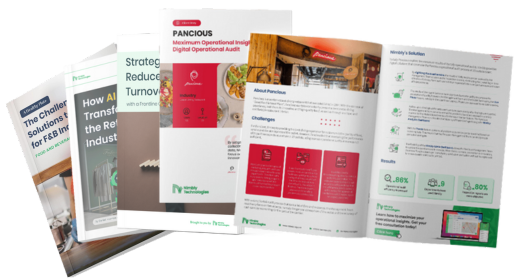

In today's ever-changing business world, maintaining top-notch quality isn't just important; it's essential for success. Quality assurance (QA) has become a crucial part of operations for businesses in every sector, from manufacturing to retail. But what exactly is QA, and why does it matter?
QA is all about making sure that your products or services consistently meet the highest standards, ensuring customer satisfaction every step of the way. It's not just about fixing problems after they happen; it's about preventing them from occurring in the first place. Think of it as a proactive approach to excellence, where every detail is carefully examined and perfected to ensure a flawless experience for your customers.
As we embrace the digital age, the way we approach QA is evolving. In this article, we'll delve into the key benefits of implementing QA the right way, tailored specifically to different types of businesses. We'll also explore how digital technology is revolutionizing QA practices, offering innovative solutions that can be applied across various industries.
So, what exactly is QA? It's a strategic and systematic approach to maintaining exceptional quality standards within an organization. Whether you're producing goods or providing services, QA ensures that every aspect of your operation is fine-tuned to deliver excellence, time and time again.

Quality assurance isn't just about making sure your products or services meet a certain standard; it's about transforming your business from the inside out. Whether you're in the food industry or retail, implementing quality assurance practices can bring a host of benefits that go beyond simply satisfying your customers. Let's take a closer look at how quality assurance can supercharge your business:
Picture a well-oiled machine humming along smoothly. That's what quality assurance does for your business operations. By optimizing every step of the process – from sourcing top-notch ingredients to fine-tuning logistical processes – you're not just cutting costs, you're also saving time and resources, ultimately boosting your bottom line.
Imagine a small bakery struggling to keep up with demand due to inefficient production processes. By implementing quality assurance measures, they streamline their operations, from sourcing high-quality ingredients to optimizing their baking schedule. As a result, they not only increase their output but also reduce waste and save valuable time, allowing them to meet customer demands more efficiently and improve their bottom line.
Quality assurance isn't just about delivering top-notch products; it's also a savvy cost-saving strategy. By catching potential issues early on, you're dodging costly recalls and repairs down the line. Plus, happy customers mean fewer returns and refunds, leaving more money in your pocket.
Consider a retail store that frequently receives complaints about defective merchandise, leading to costly returns and refunds. Through quality assurance initiatives, they identify and address potential issues in their supply chain, ensuring that only top-quality products reach their shelves. As a result, they significantly reduce their return rates, saving both money and customer goodwill in the process.
Trust is the currency of success in today's competitive market. When you consistently deliver high-quality products and services, you're not just making a sale – you're building a relationship. And that trust pays dividends in the form of loyal customers who sing your praises to anyone who will listen.
Think of a small coffee shop known for its consistently delicious brews and friendly service. Through rigorous quality assurance practices, they ensure that every cup of coffee meets their exacting standards, delighting customers with every sip. Over time, this commitment to quality builds trust and loyalty among their customer base, turning casual visitors into devoted regulars who can't wait to spread the word.
Want to take your business to new heights? Quality assurance is your ticket to ride. By maintaining top-notch quality and cost efficiency, you're laying the groundwork for sustainable growth. And as your reputation grows, so do your opportunities for expansion and partnership.
Imagine a small artisanal bakery that has gained a loyal following for its handcrafted pastries and bread. By consistently maintaining the highest quality standards and investing in quality assurance practices, they've garnered rave reviews and a strong local reputation. As a result, they decide to expand their operations by opening a second location in a neighboring town. With their proven track record of excellence, they attract investors who see the potential for growth and support their expansion efforts. The bakery's commitment to quality not only fuels their growth but also allows them to bring their delicious treats to even more customers, further solidifying their position as a beloved community staple.
Your employees are your most valuable asset, so it's essential to keep them safe. Quality assurance isn't just about delivering a great product; it's also about creating a safe and healthy work environment where everyone can thrive. From minimizing workplace hazards to promoting best practices, quality assurance plays a crucial role in protecting your most precious resource: your team.
Imagine a bustling restaurant kitchen where chefs work tirelessly to prepare mouthwatering meals for eager diners. Through comprehensive quality assurance protocols, they identify and address potential hazards, from slippery floors to faulty equipment, ensuring a safe and healthy work environment for all. As a result, accidents and injuries are minimized, allowing the team to focus on what they do best: creating culinary masterpieces that keep customers coming back for more.
Your brand's reputation is everything. Quality assurance isn't just about delivering on promises; it's also about safeguarding your brand's good name. By consistently delivering high-quality products and services, you're not just meeting expectations – you're exceeding them, earning rave reviews and building a rock-solid reputation that can weather any storm.
Consider a boutique clothing brand renowned for its timeless designs and impeccable craftsmanship. By maintaining strict quality control throughout the production process, they consistently deliver garments that exceed customer expectations, generating positive feedback and fostering a loyal community. As a result, their brand reputation remains untarnished, even in the face of market fluctuations or competitive pressures.
Quality assurance isn't a one-and-done deal; it's a journey of continuous improvement. By constantly evaluating and refining your processes, you're not just staying ahead of the competition – you're driving innovation and pushing the boundaries of what's possible.
Think about a trendy fashion retailer known for its cutting-edge designs and forward-thinking approach. Through rigorous quality assurance initiatives, they gather feedback from customers and closely monitor market trends to identify emerging preferences and tastes. Using this valuable insight, they continuously innovate their product offerings, introducing new styles and collections that resonate with their target audience. By staying ahead of the curve and delivering fresh, exciting merchandise, they maintain their status as a trendsetter in the industry, attracting fashion-forward shoppers and driving sustained growth in sales and market share.
Compliance isn't optional – it's a must. Quality assurance ensures that your products and processes meet all necessary regulations and standards, keeping you out of hot water and on the right side of the law.
Imagine a pharmaceutical company navigating a complex landscape of regulations and compliance requirements. By integrating quality assurance principles into their operations, they ensure that every product meets stringent safety and efficacy standards, mitigating the risk of regulatory penalties or legal disputes. As a result, they operate with confidence, knowing that they are upholding the highest ethical and legal standards in everything they do.
Quality assurance isn't just good for your bottom line; it's also good for the planet. By minimizing waste and optimizing resources, you're not just saving money – you're reducing your environmental footprint and doing your part to create a more sustainable future.
Consider a manufacturing plant committed to sustainability and environmental stewardship. Through quality assurance initiatives, they optimize their processes to minimize waste and reduce energy consumption, leading to significant cost savings and environmental benefits. As a result, they not only improve their bottom line but also contribute to a healthier planet for future generations to enjoy.
Quality assurance isn't just about delivering great products; it's also about creating a positive work environment where everyone feels valued and empowered. By investing in your team and giving them the tools they need to succeed, you're not just building a business – you're building a family.
Picture a bustling coffee shop where baristas are not just skilled at crafting the perfect latte but also passionate about their work. Through comprehensive quality assurance programs, the coffee shop invests in ongoing training and development for its staff, empowering them to hone their craft and deliver exceptional customer experiences. Employees are encouraged to share their ideas and feedback, fostering a culture of collaboration and innovation. As a result, baristas feel valued and motivated, leading to higher job satisfaction and lower turnover rates. This positive work environment translates into smoother operations, happier customers, and ultimately, a thriving business where everyone feels like part of the family.
| Quality Assurance (QA) | Quality Control (QC) | |
| Definition | QA is a proactive process that prevents defects and ensures quality standards throughout production or service delivery. | QC is reactive, involving inspection, testing, and defect correction post-production. |
| Primary Focus | Focuses on process improvement to avoid defects and inconsistencies. | Identifies defects and ensures end product meets quality standards. |
| Timing | Occurs before and during production or service delivery. | Takes place after production or service delivery. |
| Goals | Aim to establish a framework for meeting quality standards and customer expectations. | Identifies and rectifies defects, ensuring desired quality. |
| Methods | Involves process improvement, standards, training, audits, documentation, and prevention. | Involves inspections, testing, sampling, and measurements. |
| Responsibility | Shared by all in the organization. | Typically handled by specific teams or inspectors. |
| Outcome | Consistently high-quality products or services. | Detects and corrects defects, improving future batches. |
In summary, Quality Assurance is a proactive, preventive process that aims to establish quality standards, optimize processes, and ensure that products or services meet those standards. Quality Control, on the other hand, is a reactive, corrective process that focuses on identifying and rectifying defects in the final product or service. Both QA and QC are essential for maintaining and improving product or service quality, but they serve different roles in achieving this goal.
Quality Assurance is employed in various industries, including manufacturing, healthcare, software development, and service providers, to ensure that their products and services consistently meet high-quality benchmarks. It's a critical function for building trust with customers, maintaining a competitive edge, and minimizing costly recalls or customer complaints.


Quality assurance is a comprehensive process designed to guarantee the consistent delivery of high-quality products and services. Here's how businesses in the Food & Beverage (F&B) and Retail sectors can effectively put QA into practice:
By following these steps, businesses in the F&B and Retail industries can ensure the consistent quality of their products and services. While specific standards may differ among enterprises, the core principles of quality assurance remain unwavering.
Quality assessment in the modern age can be done with technology such as digital management tools. Nimbly, for example, provides a digital routine checklists to make sure that all the important QA tasks are completed. The inspectors and related officers can share their findings using a mobile app as opposed to slow and impractical manual records.Nimbly also offers an issue tracking feature that automatically alerts when it finds inconsistencies or other faults. The inspectors can immediately share this info with related departments, ensuring a quick response. Everything can be accessed in a digital dashboard that supports collaborative works.
Quality assurance is one of the most important tasks to do in your business. Download Nimbly now to make sure that it is done properly without faults.
